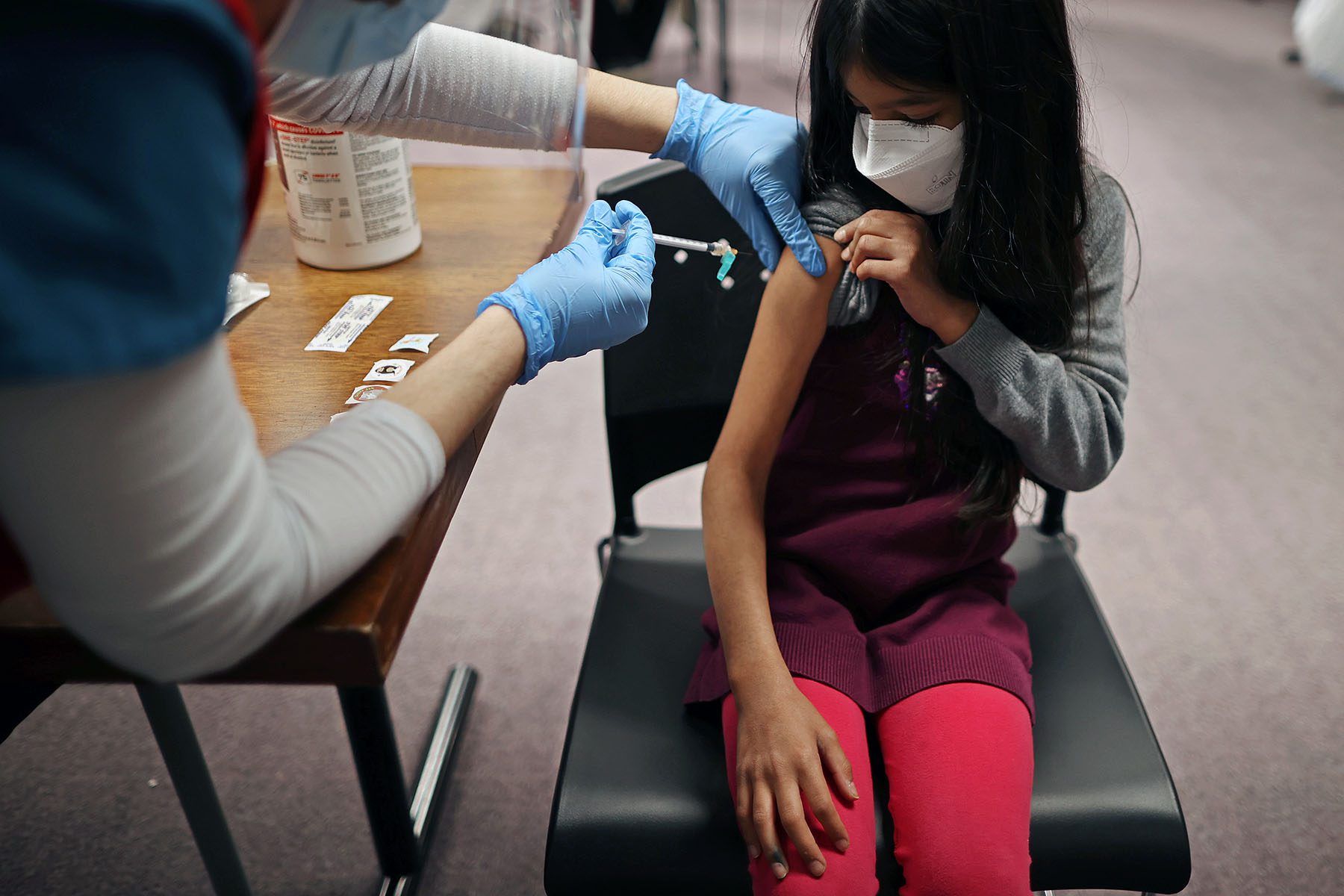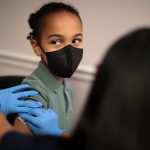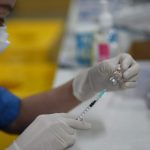The wave of COVID-19 cases and hospitalizations associated with the Omicron variant has done little to sway parents who are holding out on vaccinating their eligible kids.
About 18 percent of children ages 5 to 11 are fully vaccinated against COVID-19, according to data published by the Centers for Disease Control and Prevention. That represents a steady increase from the beginning of December, when less than 5 percent had been vaccinated. At that point, a vaccine had been available to kids that age for just over a month, and the Omicron variant was beginning to take hold in the United States.
But among children ages 12 to 17, only about 54 percent are currently vaccinated, roughly equivalent to the number of kids in that age bracket who had, as of December 1, gotten their COVID shots. Children younger than 5 remain ineligible for an authorized vaccine.
The data suggests that even as the highly transmissive Omicron variant shutters schools, brings back mask mandates, and — in rare but increasing cases — sends children to the hospital, many parents remain skeptical when it comes to vaccinating their kids against the virus. All evidence shows that the COVID-19 vaccines available in the United State are both safe and effective against the virus, and experts agree that getting more people vaccinated remains the most effective tool in battling the pandemic. But pro-vaccine messaging from the White House has been more muted.
The relative stasis in vaccinating children raises questions about what, if anything, will convince hesitant parents to opt in. Such decision-making is predominantly made by mothers, research shows, who are most often the ones taking their children to doctors’ appointments and responsible for following up on immunizations.
“For some [parents], Omicron isn’t a factor that’s moving them,” said Mallory Newall, vice president of public polling for Ipsos Public Affairs. “The same is true with the base of adults that remain unlikely to get vaccinated.”
Ipsos polling shows consistent skepticism among parents. Per polling conducted between January 7 and 10, 31 percent of parents with kids younger than 18 said they were “not at all likely to vaccinate their children against the virus. That number suggests little movement from before the Omicron variant became dominant in the United States. Polling from November and December showed similar levels — 28 percent and 25 percent, respectively — of parents said they were not likely to get their kids vaccinated.
The percentage of kids vaccinated remains substantially lower than the percentage of adults, noted Dr. Megan Ranney, an associate professor of emergency medicine at Brown University. That suggests there could be a substantial group of parents who got the vaccine for themselves but remain nervous about getting the shots for their children. Those are families who may be the easiest to reach, she said.
“For that group who believe in vaccines for themselves, who’ve gotten the vaccine for themselves but not the kids, it’s reminding them it’s a tremendously low-risk vaccine with pretty much no serious long-term effects,” she said. “And there’s a very real risk of catching COVID. Omicron has increased the perception of risk to one’s own child.”
Anecdotally, she said, she has had more conversations since mid-December with parents who were previously nervous about vaccinating their children, and who have — in the wake of Omicron — reconsidered.
“I am hearing from people that they’re recognizing the increased contagiousness of Omicron,” she said. “I think watching the increasing case counts and the challenges of hospitals and the reports of increased hospitalization of unvaccinated kids is also what moved many parents over the edge.”
The Ipsos data does show that parents’ perception of risk has increased. About 22 percent — more than 1 in 5 — said they felt sending a child to school or daycare posed a “large risk.” In October, the last time the polling company asked that question, only 11 percent agreed.
But that perception of risk may not necessarily translate into comfort with the vaccine.
Dashira Jeffrey, a 31-year-old mom from Odessa, Texas, said that, because of the spike in cases, she has briefly stopped sending her 5-year-old to school. Jeffrey works from home and has tried to minimize her household’s exposure to the virus. She’s particularly worried about the reports of increasing pediatric hospitalizations.
Still, she is undecided about the vaccine. Jeffrey hasn’t gotten the shots herself, and is concerned about getting it for her daughter, who is old enough to qualify for a vaccine. She hasn’t spoken to her own doctor or to her daughter’s pediatrician. She has spoken to her mother’s doctors, who she said strongly recommended the COVID-19 vaccine.
Jeffrey worries about whether the shots could affect her fertility — a common myth about the vaccine, though it has been consistently debunked by scientists. For her daughter, she’s afraid that the children’s version is too new to be trusted.
“I’ve heard good things and bad things. I’ve heard as much good as bad,” she said. “I possibly may get it. I don’t feel too comfortable with my daughter getting it.”
It’s not yet clear what will move the needle, said Dr. Paul Offitt, a pediatrician and director of the Vaccine Education Center at the Children’s Hospital of Philadelphia. He has worked personally to do outreach with various groups of people who may not yet be vaccinated.
But at his hospital, he said, he regularly sees kids coming in who are unvaccinated and who have developed severe COVID-19 complications. Their parents also haven’t gotten the vaccine.
He doesn’t think Omicron has changed their minds. And he’s struggling to figure out what will do the trick.
“I don’t think God coming down in human form saying, ‘Really, you should get vaccinated’ would change things,” he said. “What do we need? 850,000 people have died. I think everyone knows someone who’s been infected or suffered.”






